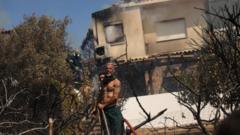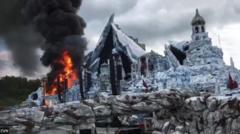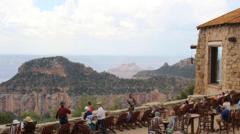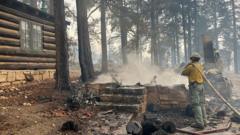The unfolding crisis in Greece highlights the urgency of addressing wildfire preparedness amid enduring heatwaves and climate change.
Coastal Towns Devastated as Wildfire Strikes Greece

Coastal Towns Devastated as Wildfire Strikes Greece
A surge of wildfires in Greece has led to the destruction of homes and mass evacuations along its southern coast.
As wildfire rages across coastal towns of Palaia Fokaia and Thymari, located approximately 40 km (25 miles) southeast of Athens, the flames have wreaked havoc, destroying at least 20 homes and prompting widespread evacuations. The inferno began in dry vegetation before it quickly engulfed residential areas, coinciding with Greece's first heatwave of the summer season, where temperatures soared up to 40°C.
Local officials report significant damage as strong winds fueled the flames, challenging efforts to contain the fire. Residents rallied alongside firefighters, forest rangers, and even aerial units to defend their homes, while the coast guard joined in patrolling the coastline. Emergency alerts were dispatched via the 112 system, advising residents to evacuate from affected towns and villages.
In an effort to combat the increased frequency of wildfires linked to prolonged, hot summers and climate change, Greek authorities have deployed an additional 18,000 firefighters along with volunteers this fire season, which runs through October. Only earlier this week, thousands of hectares were burned on Chios, Greece's fifth-largest island, where a Georgian woman was arrested for allegedly igniting a fire by inadvertently dropping a cigarette.
Witnesses in Thymari described frantic scenes; one resident recounted arriving home to find it reduced to ashes amid the fierce winds, while others were luckier, with some homes miraculously spared in nearby neighborhoods. The fire extended beyond urban areas, crossing major roadways and threatening the scenic ridge close to Cape Sounion at the Attica peninsula's tip.
Local authorities successfully evacuated over 1,000 individuals from danger zones, including a dramatic rescue of 11 tourists trapped on a beach as flames advanced. However, despite evacuation orders, some individuals resisted leaving, opting to defend their properties with improvised tools like garden hoses, prompting warnings from emergency services about the risks involved.
Reports indicate that the fire service is engaged in an ongoing battle, both on foot and from the air, with a focus on areas perilously close to homes. Babis Galanis, a local deputy mayor, stated that all municipal facilities were prepared to provide shelter and medical support to those in need.
In a move to understand the cause of the fire, Greece's fire service has dispatched a special arson investigation unit to explore the possibility of foul play. Meanwhile, forecasts predict even harsher conditions on Friday, with high temperatures and an elevated wildfire risk looming over Attica, Evia, the Peloponnese, and northern Aegean regions.
Local officials report significant damage as strong winds fueled the flames, challenging efforts to contain the fire. Residents rallied alongside firefighters, forest rangers, and even aerial units to defend their homes, while the coast guard joined in patrolling the coastline. Emergency alerts were dispatched via the 112 system, advising residents to evacuate from affected towns and villages.
In an effort to combat the increased frequency of wildfires linked to prolonged, hot summers and climate change, Greek authorities have deployed an additional 18,000 firefighters along with volunteers this fire season, which runs through October. Only earlier this week, thousands of hectares were burned on Chios, Greece's fifth-largest island, where a Georgian woman was arrested for allegedly igniting a fire by inadvertently dropping a cigarette.
Witnesses in Thymari described frantic scenes; one resident recounted arriving home to find it reduced to ashes amid the fierce winds, while others were luckier, with some homes miraculously spared in nearby neighborhoods. The fire extended beyond urban areas, crossing major roadways and threatening the scenic ridge close to Cape Sounion at the Attica peninsula's tip.
Local authorities successfully evacuated over 1,000 individuals from danger zones, including a dramatic rescue of 11 tourists trapped on a beach as flames advanced. However, despite evacuation orders, some individuals resisted leaving, opting to defend their properties with improvised tools like garden hoses, prompting warnings from emergency services about the risks involved.
Reports indicate that the fire service is engaged in an ongoing battle, both on foot and from the air, with a focus on areas perilously close to homes. Babis Galanis, a local deputy mayor, stated that all municipal facilities were prepared to provide shelter and medical support to those in need.
In a move to understand the cause of the fire, Greece's fire service has dispatched a special arson investigation unit to explore the possibility of foul play. Meanwhile, forecasts predict even harsher conditions on Friday, with high temperatures and an elevated wildfire risk looming over Attica, Evia, the Peloponnese, and northern Aegean regions.


















